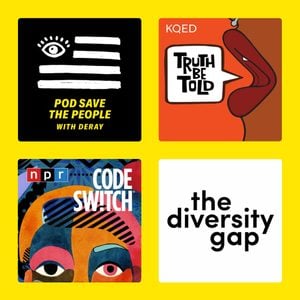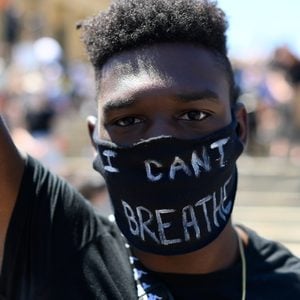20 Everyday Acts of Racism That Don’t Get Talked About Enough
Updated: Nov. 04, 2022
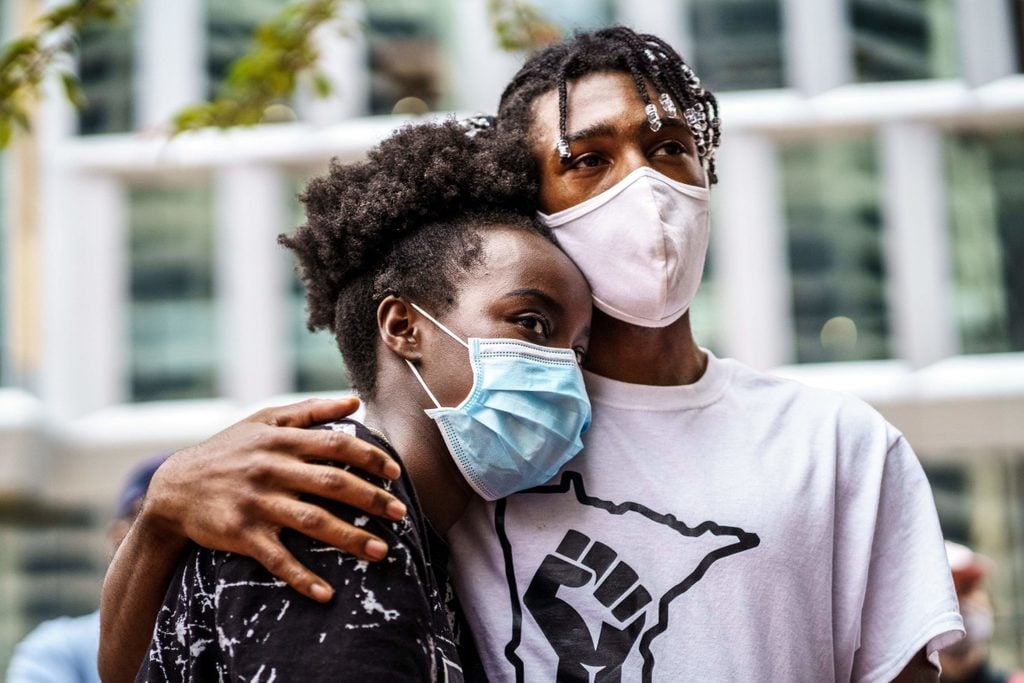
America has an unacceptable habit of addressing racism only when it’s shoved in its face, when there’s nowhere else to look. It took global protests in the middle of a pandemic for parts of this country to wake up to police brutality and systemic racism. But it shouldn’t take the murders of Breonna Taylor, Ahmaud Arbery, George Floyd, Tony McDade, and countless other Black Americans for people to analyze the racism embedded in America. Getting unjustly shot and killed by police is one of the most physically damaging examples of racism in this country, but not enough people understand the daily instances of racism that Black and brown people experience—the ones that leave psychological scars. Here are just some of those instances, placed in front of your face, so you can’t look away. Then learn how to fight racism every day in a number of small ways.
Watching Broadway shows while Black
“My freshman year at the University of New Hampshire, while watching Rent with friends and peers, a non-Black person of color commented on Rosario Dawson’s appearance by stating, ‘She’s pretty cute for a Black girl,’ while I was sitting right beside him.” —Sierra E. By the way, this is why you should stop saying, “I don’t see color.”
Listening while Black
“My junior year at Syracuse University, a non-Black person of color used the N-word when speaking about Black men, told me that I was ‘not like other Black people,’ and then tried to apologize for his racism by blaming his grandmother for his upbringing.” —Vivian H.
Lunching while Black
“While eating lunch with white college friends, one guy was discussing Jon ‘Bones’ Jones’ chances in an upcoming fight and said, ‘I see him on all fours, so I think he’ll probably monkey his way out.'” —Jourdan G. These 12 everyday expressions are also racist.
Overhearing conversations while Black
“I was in the car with a white friend while he was on a speaker call with his sister. She was talking about her date for an upcoming formal and said, ‘Don’t worry, he’s not Black. He’s just brown. Don’t freak out. I think his mom is, like, half Mexican or something.’ My white friend then changed the subject.” —Jamal W.
Dealing with coworkers while Black
“During my first full-time job in Syracuse, when I was the only Black employee there at the time, one white employee frequently used the N-word. Another said that Beyoncé’s Super Bowl performance was similar to the KKK. Another said that Colin Kaepernick shouldn’t be complaining since he plays a sport that is celebrated by all. Another nicknamed me ‘token’ at a Buffalo Bills tailgate.” —Tiffany K. Aside from blatantly racist comments, here are another 11 things to never say at work.
Working while Black
“I work as a bank teller and normally there would be no problem with that, but I am a Black woman. There is a moment that will always stick out to me, and that was when a woman asked to speak to my manager. She proceeded to talk in front of me and ask him what the bank would do if I decided to steal all of her information and buy myself a new car. How could she know what I would do with all of her private information? I had to sit there and listen to my manager reassure her that her information was safe, because I’m Black.” —Anna B.
Going to the corner store while Black
“When I was around ten years old, my cousins and I were spending the summer at my great-grandma’s in the South. We walked to the neighborhood corner store in a group one hot day to get snacks and juice. As we are walking up, we see a group of non-Black kids, clearly together, come out of the store all at once. When we tried to enter, we were told we could only enter two at a time. When we asked why, the owner made us get out and threatened us. When we came back with adults, the owner accused us of stealing. My family never shopped there again. I cried the whole way home. Not because I was sad but because I was angry. And so were my cousins and aunts. How do you terrorize kids and criminalize them because of their skin color?” —Tyler L.
Buying lunch while brown
 “I can remember being in eighth grade and waiting in the lunch line to get my food when a kid called me a Chink. That same kid would stretch the corners of his eyes every time I saw him during lunch. I was embarrassed, so I pretended I didn’t care when I really did. One day, a teacher saw him doing the ‘Asian eyes’ at me and yelled at him. During my next class, I was called down to the principal’s office. The principal asked me what happened and if I was upset by what happened, not knowing this was going on every day I saw this kid at lunch. I lied and told the principal I was unbothered, even said we were friends. I was too embarrassed to show any feelings.” —Lily V.
“I can remember being in eighth grade and waiting in the lunch line to get my food when a kid called me a Chink. That same kid would stretch the corners of his eyes every time I saw him during lunch. I was embarrassed, so I pretended I didn’t care when I really did. One day, a teacher saw him doing the ‘Asian eyes’ at me and yelled at him. During my next class, I was called down to the principal’s office. The principal asked me what happened and if I was upset by what happened, not knowing this was going on every day I saw this kid at lunch. I lied and told the principal I was unbothered, even said we were friends. I was too embarrassed to show any feelings.” —Lily V.
Sporting your hair while Black
“During one lunch period in high school, a teammate and someone I considered a friend announced to our entire friend group that my hair texture reminded her of the homeless man who always walked around town. Like his hair, mine reminded her of a bristle brush.” —Dawn C.
Talking to friends during lunch while Black
“When I was a junior in high school, I sat with three girls at lunch. Two of them I wasn’t very fond of, but one was my best friend growing up. One of the girls, in particular, liked basketball; if we didn’t stop her, she would spend the entire lunch period talking about the sport. One day her team lost, and as she angrily recapped the match, she said, ‘Those n**gers just couldn’t figure out how to play the game.’ I was shocked. I remember standing up, cursing at her, her crying, everything going black, and then somehow I was in the bathroom. After that, the girl texted me a few apologies and tried talking to me, but I ignored her and avoided sitting with that group all together at lunch. The most hurtful part of that entire situation happened a few weeks later. The girl who was one of my best friends pulled me aside to say that I needed to let the situation go because the girl who said the N-word apologized. She said: ‘You can’t be mad at everyone who says something you don’t like.'” —Janae P.
How should a true friend have acted? Read this story about how a black athlete’s friends took a stand when he was denied entry to a tournament.
Going to school while Black
“Going to a Catholic school for the first eight years of my life meant that I was one of the few students of color in my classes. In the fourth grade, I remember being called the N-word by a white boy. When I told an adult, only an apology was given by the boy. His dad was a cop, and I still feel that had to do with why nothing more happened.” —Marissa M.
Sitting in history class while Black

“After going to a predominantly Black private school, I had moved to a small rural town in New Jersey and started to attend an all-white public school. It was a major culture shock, and my twin sister and I were some of the only and first Black students in the school. It was a hard adjustment, but most of the kids were nice to me—at least to my face—and I had a good amount of friends. It was Black History Month, and so we started to learn about slaves, the brown paper bag test, and how some slaves were light-skinned and could pass as white. I remember feeling so uncomfortable and could feel the entire class’s eyes on me. I made eye contact with one white girl, and I just knew she was about to say something ignorant. After looking at me, she raised her hand and asked, ‘Would they be able to tell Nakia was Black back then?’ I don’t even remember what the teacher’s response was because I was in shock. But I do know the teacher left me feeling isolated and alone and did not even address the white student’s comments or consider how it would make me feel. I will never forget that experience, and when I got to high school, that same white girl debated me in the debate club on why she thought affirmative action was unnecessary.” —Nakia S. Incidents like this are among the many reasons why Black History Month shouldn’t be a single month.
Dealing with educators while Black
“As a senior in high school, there was a rule my white English teacher created. If she deemed you had completed the class with a good enough grade, you did not have to take her final exam. She made my Black male friend and I take her exam. We both failed. We talked to her after, questioning why we were the only ones in her class to have to take the final. She repeatedly told us that we were only good athletes and not smart enough for her class or college. Immediately after our graduation ceremony, she insisted on sending congratulations to all her white students on graduation day…but didn’t for myself and my friend. Instead, she sent an email to our parents and us expressing how we failed her exam and didn’t have the academic tools to succeed.” —Nick W.
Playing video games while Black
“I once went over to my good friend’s house to play video games with him, and while I was there, he started yelling at other players, calling them ‘dumb [expletive] n**gers.’ After being shocked and saddened by this I left, and that was the end of our friendship—which, at this point, had lasted four years. I was 15 years old, and he was 16 years old at the time.” —Stephen P.
Playing sports while Black
“During one of my football games in high school, a Black player on the opposing team got knocked out by one of my teammates on a play and didn’t get up. While on the sideline I said, ‘I hope he’s OK,’ and one of the offensive linemen on my team responded, ‘I don’t give a [crap] about that n**ger,’ in front of me and five other white teammates. After he made that comment, he quickly covered his mouth and said, ‘Oops, I forgot you were there.’ I looked at him in fury and said some unflattering words, but unfortunately, I could not confront him for long because I had to go back into the game. It hurt me that none of my teammates confronted this particular teammate for saying that racist slur. It made me question whether they had the same views.” —Miles H. Learn what anti-racism means and what it means to be anti-racist.
Enjoying nature while Black
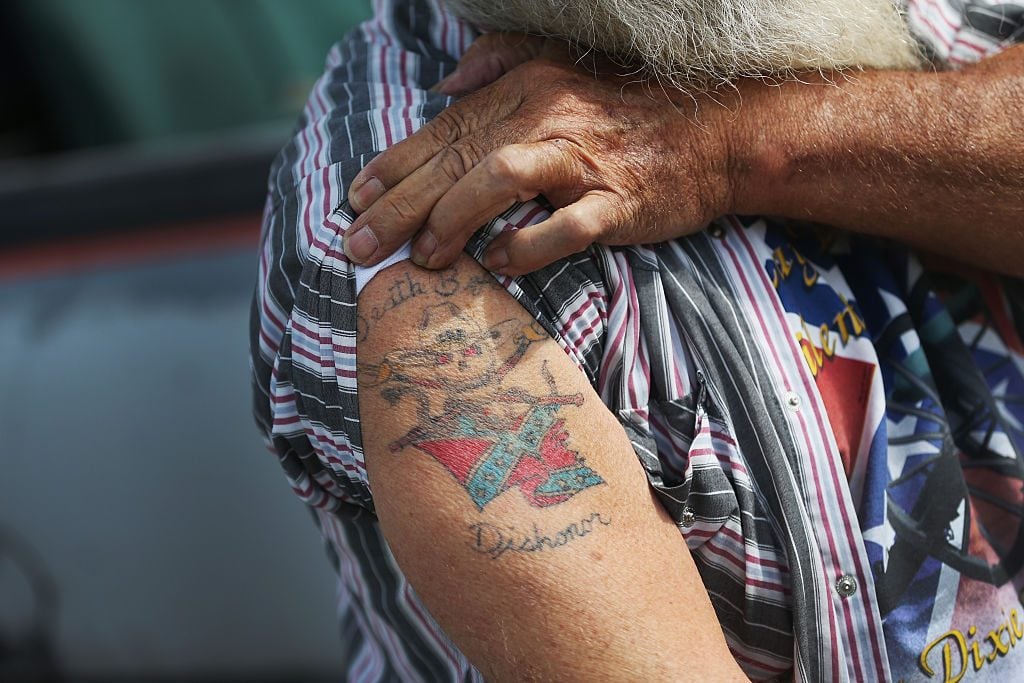
“I was at a Georgia waterfall with my boyfriend, and a man with a large Confederate tattoo loudly told his daughter to stay away from us. He walked up a steep hill and back down to avoid walking past us because we were sitting along the path. Then he watched us the entire time.” —Maleka W.
Traveling while brown
“I was going on my first business trip and was super excited. I walked up to the TSA agent and handed him my passport and ticket to be checked, then proceeded to walk toward the metal detectors. When it was my turn to walk through, the woman on the other side looked me up and down, looked back at the TSA agent who had checked my passport, and said, ‘Ma’am, I need you to take your sweater off—you look threatening.’ I was then pulled aside, patted down, had all my bags tested for bomb residue, and was then questioned. I know it wasn’t random; the TSA agent saw my Arab first name, flipped through my passport book, and saw a bunch of Middle Eastern country stamps. I was terrified and embarrassed while everyone watched this go down. They didn’t even give me a ‘private’ room through the whole ordeal.” —Nada S.
Repping your alma mater while Black
“One casual Friday at work, I decided to wear jeans and a sweater from my alma mater, Cornell University. As I sat down at my desk that morning, my coworker who sat directly across from me stood up and said, ‘Oh, wow, Cornell—what a great school! Who do you know that went there?’ I had to quickly stop my face from twisting and my mouth from saying something smart because clearly she didn’t think that someone Black like me could be smart enough to attend Cornell. I politely responded, ‘What do you mean?’ She then proceeded to ask who gave me the shirt, clearly assuming I could not have attended the university myself. Eventually, I laughed and just said, ‘I did.’ She looked taken aback but congratulated me on such an achievement.” —Brianna P. Don’t miss these 15 essential books for understanding race relations in America.
Ordering coffee while Black
“I was waiting in line at a local coffee shop, and during my wait, a white woman came up behind me. When it was my turn to order, the barista ignored me and addressed the woman behind me, calling her up to the counter instead. I noticed her begin to move forward, so I stepped up and said, ‘No, I was here first.’ After the barista took my order, he immediately took hers. I watched him make a drink, which I assumed was mine, but then he called out an order that belonged to the other woman. I was left there to wait five more minutes after she was gone. The barista didn’t even call out my order. Just placed it near the edge and looked at me.” —Hannah J.
Loving family while Black
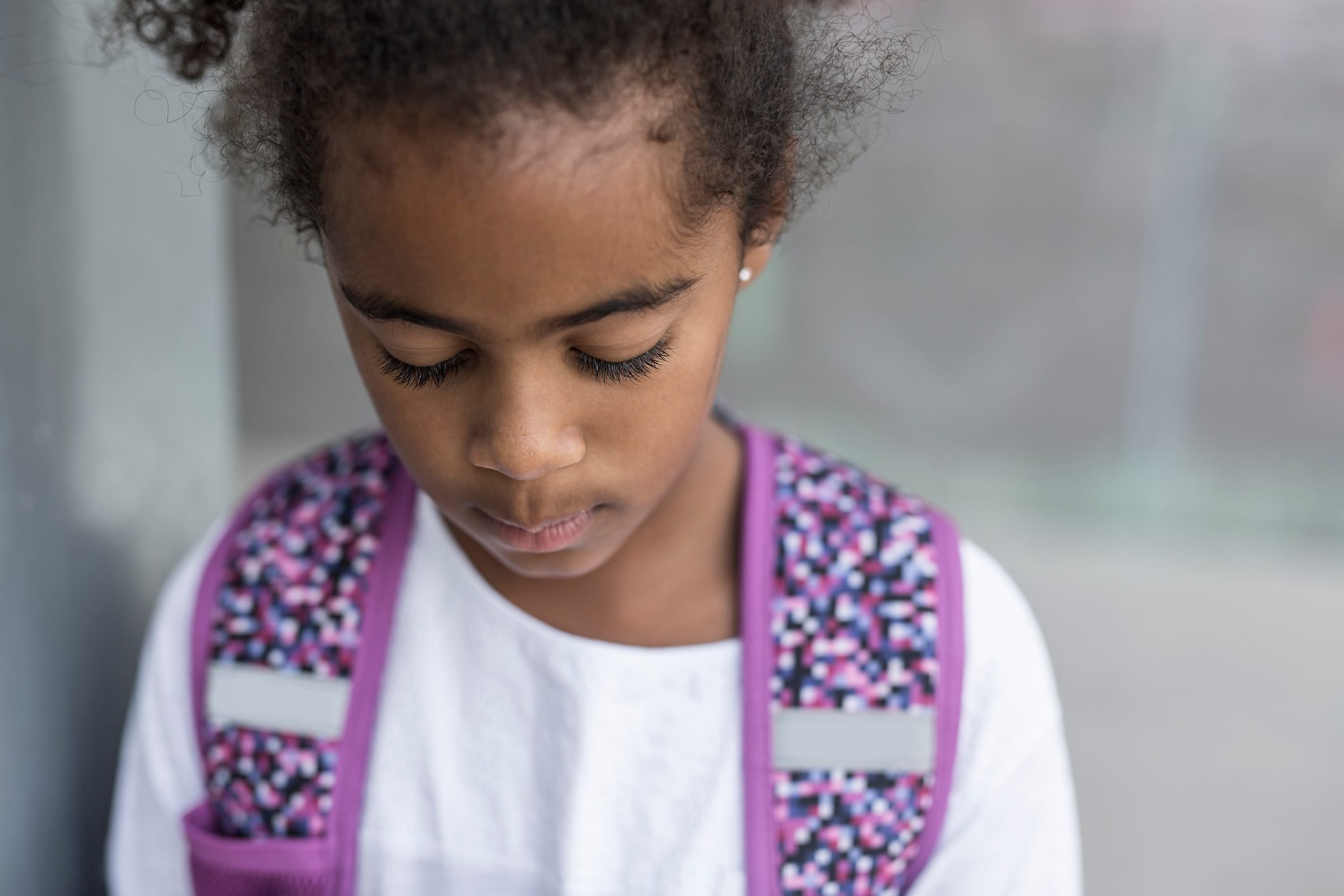
“I was adopted when I was 17 months old. All I’ve ever known is my foster family and my adoptive family. My brother and I are seven years apart, so we were in the same K–8 school, and when I was in kindergarten, he was in sixth grade. One day in the cafeteria, I went to say hi to him at his lunch table. A boy in his class asked, ‘Who’s that?’ To which my brother replied, ‘My little sister.’ The boy then told me that I couldn’t be his sister because I was brown and he was white, then laughed at me. At 5 years old, I wasn’t programmed to see color. I was programmed to see who was family and who wasn’t, and I knew that was my brother. That night, my parents explained what adoption and racism were to me, and that day has never left my memory.” —Sarah H.
For more on this important issue, see our guide to the Fight Against Racism.


